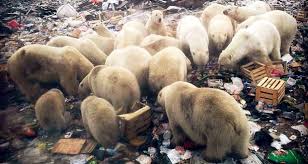And we were afraid of wild pigs!!
Russia is battling an unprecedented invasion of polar bears on a remote Arctic archipelago that is home to the country’s most northerly military base. Known locally as “Lords of the Arctic”, the wild animals have been terrorising the population on Novaya Zemlya, a group of mountainous islands off Russia’s northern coast once used as a testing ground for atomic bombs.

Russia is battling an unprecedented invasion of polar bears on a remote Arctic archipelago that is home to the country’s most northerly military base. Known locally as “Lords of the Arctic”, the wild animals have been terrorising the population on Novaya Zemlya, a group of mountainous islands off Russia’s northern coast once used as a testing ground for atomic bombs.
“People are scared, afraid to leave their homes, daily routines are being broken, and parents are unwilling to let their children go to school and kindergartens,” according to Alexander Minaev, the deputy head of the local government in Novaya Zemlya. Global warming is melting Arctic ice, forcing polar bears to abandon their traditional habitat and move closer to human settlements in search of food. But hunting the unwelcome visitors is prohibited in Russia where polar bears are officially protected as an endangered species.
The government in Russia’s Arkhangelsk region declared a state of emergency on Novaya Zemlya on Saturday citing an unprecedented build-up in the number of polar bears in the remote region since December last year.
Some 52 bears have been sighted around Belushya Guba, the biggest settlement on the islands – or about one bear for every 10 members of the local population.
Aggressive behaviour
Most of the animals appear to have holed up in a disused military garrison, but some have ventured out to enter residential and public buildings and displayed “aggressive behaviour”. Army personnel have been trying to drive out the bears using non-lethal measures. But the polar bears are so “convinced of their own safety” they ignore barking dogs, bright lights and loud noises intended to scare them away, local officials said.
Rosprirodnadzor, the Russian environmental watchdog, has so far refused permission to shoot the bears, but is sending a special commission to Novaya Zemlya to assess the problem. Local authorities are calling for drastic action and say a cull may be inevitable.
Unprecedented
Zhigansha Musin, the head of the Novaya Zemlya administration, said the number of polar bears sighted was unprecedented. “I have been on Novaya Zemlya since 1983 and there has never been such a mass invasion,” he said. “They have literally been chasing people.”
Polar bears migrate from the south to the north of the Novaya Zemlya archipelago in response to seasonal changes in ice conditions, Ilya Mordvintsev, an ecological and evolution specialist at the Russian Academy of Sciences, told the Tass news agency. They were stopping off at Beyusha Guba to search for food in local dustbins.
“If there was no alternative source of food there, they would probably pass straight by” without stopping, he added. Polar bears are facing an increasing struggle to survive as global climate change warms the Arctic Oceans shrinking their natural habitat. The World Wildlife Fund estimates there are 22,000 polar bears left in the world and that their numbers could shrink by 30 per cent by 2050.
Industrial developments in the Arctic where oil companies are exploring for new resources are also a threat to the species.
The Irish Times, 11 Feb 2109

No hay comentarios:
Publicar un comentario